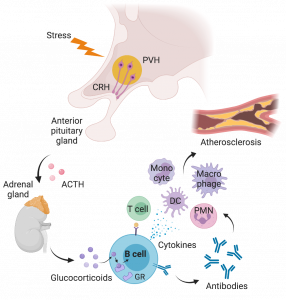Cardiovascular disease (CVD) is the leading cause of global morbidity and mortality. While psychological stress is a known cardiovascular risk factor, the mechanism by which the brain translates stress into CVD is poorly understood. B cells are known to contribute to the progression of atherosclerosis, the lipid-driven chronic inflammatory disease that is often the cause of heart attacks and strokes. It remains unknown, however, whether B cells mediate the effects of stress on CVD. Here, we are testing the hypothesis that stress aggravates atherosclerosis by modulating B cell function. We employ a combination of optogenetic and chemogenetic approaches to manipulate specific regions in the brain and characterize the subsequent impact on B cell phenotype and functional diversity. These studies will help delineate potential immuno-therapeutic targets in the prevention and treatment of CVD and provide direct mechanistic links between stress and chronic inflammation.

Schematic of the proposed mechanism via which stress modulates B cell functions to alter atherosclerosis. PVH: Paraventricular nucleus of the hypothalamus; CRH: Corticotropin-releasing hormone; ACTH: Adrenocorticotropic hormone; GR: Glucocorticoid Receptor; DC: Dendritic cell; PMN: Polymorphonuclear cell.
